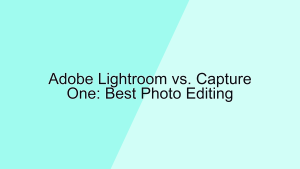Top 3 Alternatives to Adobe Lightroom You Should Consider
Adobe Lightroom is a powerful tool used by photographers worldwide for photo editing and management. However, it may not be the best fit for everyone due to its subscription model and cost. Fortunately, there are several excellent alternatives that provide robust features and user-friendly interfaces. Here, we explore the top three alternatives to Adobe Lightroom that you should consider.
1. Capture One Pro
Capture One Pro is a professional-grade photo editing software developed by Phase One. It is renowned for its superior color grading tools and exceptional image quality, making it a favorite among professional photographers.
- Advanced Color Editing
- Precision and Control: Capture One Pro offers unparalleled control over color editing. Its Advanced Color Editor allows users to select and adjust colors with precision, providing tools to refine hue, saturation, and lightness. This level of control is especially beneficial for photographers who need to maintain color accuracy or achieve specific artistic effects. The ability to create and save custom color profiles also enhances workflow efficiency, enabling consistent color grading across multiple projects.
- Color Balance Tool: The Color Balance Tool in Capture One Pro is another standout feature. It allows users to adjust the color tones in the shadows, midtones, and highlights independently, providing greater flexibility in achieving the desired look. This tool is particularly useful for creating mood and atmosphere in images, from warm, golden-hour tones to cool, moody blues. Users appreciate the intuitive interface and the visual feedback provided by the color wheels, which make complex color adjustments more accessible and manageable.
- Tethered Shooting
- Real-Time Editing: One of the key features that sets Capture One Pro apart is its robust tethered shooting capabilities. This feature allows photographers to connect their camera directly to the software for real-time image transfer and editing. This is particularly useful in studio settings where immediate feedback is crucial. Photographers can see their shots on a larger screen, make adjustments on the fly, and ensure they get the perfect shot without delay. This seamless integration between camera and software streamlines the shooting process and enhances productivity.
- Live View: The Live View functionality in Capture One Pro further enhances the tethered shooting experience. It allows photographers to see a live feed from their camera within the software, providing an accurate preview of the composition, focus, and exposure. This feature is invaluable for fine-tuning settings and making precise adjustments before taking the shot. The ability to overlay guides and grids in Live View also aids in achieving perfect alignment and composition, which is essential for high-quality professional photography.
2. DxO PhotoLab
DxO PhotoLab is another powerful alternative to Adobe Lightroom, known for its advanced image processing algorithms and noise reduction capabilities. Developed by DxO Labs, this software offers a comprehensive set of tools for both amateur and professional photographers.
- DeepPRIME Technology
- Superior Noise Reduction: DxO PhotoLab’s DeepPRIME technology is a game-changer for photographers dealing with low-light conditions and high ISO settings. This AI-powered noise reduction tool analyzes the image at a pixel level and effectively reduces noise while preserving detail and sharpness. Users frequently highlight the effectiveness of DeepPRIME in producing clean, high-quality images without the typical artifacts and softness associated with traditional noise reduction techniques. This makes DxO PhotoLab an excellent choice for photographers who often shoot in challenging lighting conditions.
- Detail Preservation: Unlike many noise reduction tools that compromise image detail, DeepPRIME excels in maintaining the integrity of fine details. This is particularly important for large prints or high-resolution displays where image quality is paramount. Users appreciate the balance that DeepPRIME strikes between noise reduction and detail preservation, resulting in images that are both clean and richly detailed. This advanced technology sets DxO PhotoLab apart from other photo editing software, making it a preferred choice for quality-conscious photographers.
- Optics Modules
- Lens Corrections: DxO PhotoLab offers an extensive library of optics modules that provide automatic lens corrections for a wide range of camera and lens combinations. These corrections address common optical issues such as distortion, vignetting, and chromatic aberration, ensuring that images are rendered with maximum clarity and fidelity. Users benefit from the convenience of automatic corrections that are tailored to their specific equipment, saving time and effort in the post-processing workflow. This feature is particularly valuable for photographers who use multiple lenses and need consistent, high-quality results.
- Customization Options: In addition to automatic corrections, DxO PhotoLab allows users to manually adjust lens correction settings to suit their preferences. This flexibility is appreciated by photographers who want to fine-tune the look of their images or correct for specific shooting conditions. The ability to customize lens corrections ensures that users can achieve the exact visual outcome they desire, from perfectly rectified architectural shots to creatively distorted artistic images. The combination of automatic and manual correction options makes DxO PhotoLab a versatile and powerful tool for lens correction.
3. Luminar AI
Luminar AI by Skylum is a revolutionary photo editing software that leverages artificial intelligence to simplify and enhance the editing process. It is designed to be user-friendly, making it an excellent choice for both beginners and experienced photographers.
- AI-Powered Editing
- Automated Enhancements: Luminar AI stands out for its AI-powered editing tools that automate complex adjustments, making photo editing accessible to everyone. Features like AI Sky Replacement, AI Structure, and AI Skin Enhancer allow users to achieve professional-quality edits with minimal effort. The software analyzes the image and intelligently applies enhancements, saving time and reducing the learning curve for new users. This automation is particularly beneficial for photographers who need to process large batches of images quickly without sacrificing quality.
- Customization and Control: Despite its automation capabilities, Luminar AI also provides users with manual control over the editing process. Users can fine-tune AI adjustments to match their creative vision, ensuring that the final result aligns with their artistic intent. This balance between automation and manual control is a key strength of Luminar AI, as it caters to a wide range of users, from those seeking quick, one-click enhancements to those who want to delve deeper into the editing process and make precise adjustments.
- Templates and Presets
- Creative Templates: Luminar AI offers a variety of creative templates that provide users with a starting point for their edits. These templates are designed by professional photographers and cover a wide range of styles and genres, from landscape and portrait to street and fashion photography. Users can apply these templates with a single click and then further customize the settings to suit their specific needs. This feature is particularly useful for beginners who may not be familiar with advanced editing techniques, as it provides a quick and easy way to achieve stunning results.
- Personalized Recommendations: One of the unique features of Luminar AI is its ability to provide personalized template recommendations based on the content of the image. The software analyzes the photo and suggests templates that are likely to enhance its visual appeal. Users appreciate this intelligent recommendation system as it simplifies the editing process and helps them discover new styles and techniques. The combination of creative templates and personalized recommendations makes Luminar AI a powerful tool for both inspiration and efficiency in photo editing.
Conclusion
While Adobe Lightroom remains a popular choice for photo editing, alternatives like Capture One Pro, DxO PhotoLab, and Luminar AI offer unique features and benefits that make them worthy of consideration. Each of these alternatives provides powerful tools and capabilities that cater to different needs and preferences, from advanced color editing and noise reduction to AI-powered automation and creative templates. By exploring these options, photographers can find the software that best suits their workflow and enhances their creative process.












